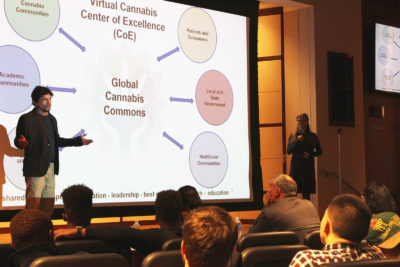
Finalists presented their cannabis business concepts to about 100 people and a panel of judges at Boston University’s Questrom School of Business for the first ever Cannabis Start-up Challenge Tuesday evening.
Along with the BUzz Lab — BU’s center for entrepreneurship — the presentation was hosted by Green Lion Partners, a Colorado-based business strategy firm dedicated to early-stage expansion in the regulated cannabis industry. A networking cocktail followed the two-hour presentation.
Five finalists presented their cannabis-related business ideas before four expert judges. The Cannabis Center of Excellence, a finalist group that designs models to impact medical, social and economic innovations, was named the winner of the contest after a brief deliberation from the judges. They will receive $10,000 and advisement from Green Lion Partners.
The finalist groups that exhibited ancillary concepts to judges and attendees include GrowPro, which proposed a cultivation management program allowing for complete control through an online portal; CannEvents, which provides a platform for finding and hosting cannabis-related events; and Hyasynth Bio, which presented an idea for a large-scale supply for active compounds in cannabis by growing yeast instead of plants.
Jameson Hollis, a finalist who presented the idea for CannEvents and Sargent College of Health and Rehabilitation Sciences alumnus, said during his demonstration he and his brother Joshua, with whom he presented, are avid entrepreneurs.
“We started with going to our grandmother’s house in the middle of Columbus, Georgia, a very rural area, and collecting pecans from a burlap sack so we could sell in our neighborhood,” he said. “We did that when we were eight years old and we’ve always just connected, and we’ve always wanted to push each other forward to create valuable change.”
During its presentation, CannEvents was pressed by judge Charley Lax, a Questrom alumnus and bank partner, who questioned the team’s revenue model. Joshua Hollis, a member of CannEvents and a College of Arts and Sciences sophomore, said Lax’s words were unfair.
“As far as the last question we got, I think it was kind of harsh,” Hollis said after the presentation. “I talked to the judge again, and he really thought we only had [one] revenue model, so I feel like he didn’t listen to the rest of our revenue models. He basically re-emphasized something we said in the presentation, which is what I was trying to tell him.”
Jeffrey Zucker, co-founder and president of Green Lion Partners, said a cannabis startup competition had been on his mind for some time. After cannabis was legalized in Massachusetts last November, the Questrom alumnus got the go-ahead to organize the challenge from BU in February and has been working on the logistics ever since.
“The purpose of the competition is to introduce the BU community to the cannabis industry, how many opportunities there are in it and how many people’s lives are improving because of it,” Zucker wrote in an email. “This was an opportunity for BU to show that they want to be at the forefront of this burgeoning industry.”
Zucker said he received 15 applications, most of which were “of very high quality.” He narrowed them down to five finalists by selecting those which he felt had the most chance of long-term success.
“A big part of [long-term success] is the investability of the concept — if investors aren’t interested, it’s hard for the company to make it anywhere,” Zucker wrote. “This is an industry rooted in advocacy, and it’s important for participants to join the fight. We can’t rest until all patients have access to the medicine they desperately need and until no single adult is punished for this plant.”
Ian Mashiter, director of the BUzz Lab, said the objective of the challenge is to offer students opportunities in an innovative and developing industry.
“[The short-term goal is to] gauge the interest in the BU alum and student community in this new emerging and fast-growing industry,” he said. “[The long-term goal is to] position the BU entrepreneurship program as leading-edge and to provide opportunities in new industries.”
Several of the attendees at the competition said they thought the presentations offered an interesting perspective on a budding field.
Lucas Berstein, a senior in Questrom, said jumping into cannabis-related businesses is shrewd, as the industry is up-and-coming.
“Just because this is an industry where the playing field is relatively level and no one has been in it before,” Berstein said, “there’s a lot of opportunities for new groups to gain market share quickly as they differentiate themselves from other industries.”
Jules Schenkel, a junior in CAS, said he believed certain groups had an unfair advantage because they each had diverse funding.
“I’m here to support my friends and learn more about the cannabis industry, which I don’t know very much about,” Schenkel said, “though it seems like they were all at different levels. I was really impressed by ideas offered during the presentations.”
Nanjun Li, a first-year graduate student in Questrom, said he applied for the competition but didn’t make it through to the final cut.
“I wanted to see other teams’ ideas and presentations so I could learn something from them,” Li said. “It’s an awesome idea to have this competition in order to find new ideas and create startups.”





















































































































